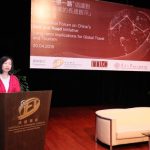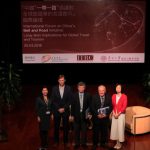 Panel Discussion
Panel Discussion
On 20 April, IFT Tourism Research Centre (ITRC) and the College of Tourism and Service Management of Nankai University jointly organised an international forum with Nankai University on China’s Belt and Road Initiative: Long-term Implications for Global Travel and Tourism.
The international forum invited international scholars and experts in panel discussions to jointly share their insights and exchange ideas on key questions related to China’s Belt and Road Initiative’s long-term impact on global travel and tourism.
During the event, President of IFT, Dr. Fanny Vong and Dean Designate of College of Tourism and Service Management of Nankai University, Prof. Hanqin Qiu gave their welcome remarks respectively. Moderators and discussants of the panel discussions included Emeritus Professor of International Tourism of the University of Strathclyde, UK and elected member of the International Academy for the Study of Tourism, Prof. Carson Lewis Jenkins, Assistant Professor of IFT, Dr. Eve Ren, Prof. Richard W. X. Hu, Department of Politics & Public Administration, University of Hong Kong, Dr. Tim Summers, Centre for China Studies, The Chinese University of Hong Kong, Prof. Hanqin Qiu, College of Tourism and Service Management, Nankai University, Dr. Hong Yu, East Asian Institute, National University of Singapore and Dr. Yanzheng Tuo, Silk Road Tourism Research Center, Nankai University.
While most discussions about the Belt and Road revolve around infrastructure, economic, and trade development, few, if any, in-depth dialogues have taken place focusing on the initiative’s long-term impact on global travel and tourism. Given the Belt and Road initiative also envisions cooperation in regional tourism and the development of cross-country tourism routes and products, the aim of this forum was to discuss and address some of the most important issues affecting global travel and tourism as a result of the momentous change, opportunities, as well as challenges brought forth by the Belt and Road initiative.
Through organising and participating in international conferences, ITRC of IFT plays a more active role in fostering research locally and internationally. Its collaboration with other universities helps bring attention to the most relevant issues about tourism related developments as well as benefit the tourism development of Macao in the long run.
Established in 1995, the Institute for Tourism Studies, Macao (IFT) offers the most extensive selection of tourism and hospitality related bachelor degree programmes in Macao, and about twenty thousand participants attend its vocational and professional training courses annually. IFT collaborates with 104 universities and tourism organisations around the world, and builds strong links with 500 leading tourism and hospitality corporations to offer internship opportunities to its students. Being the first institution accredited by the UNWTO.TedQual Certification System for tourism education, IFT has now 8 bachelor degree programmes with the Certification. Currently, the Institute has the most number of bachelor degree programmes certified under the System of any tertiary education establishment worldwide. In 2017, IFT became the world’s first higher education institution to pass International Quality Review(IQR) from the UK's Quality Assurance Agency for Higher Education (QAA). IFT has been highly ranked by QS World University Rankings in the subject area ofHospitality and Leisure Management. In addition, IFT has received the Medal of Merit in Tourism from the Macao SAR Government, and twice won the Gold Award in ‘Education and Training’ from the Pacific Asia Travel Association (PATA).
View gallery



